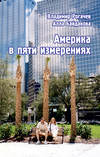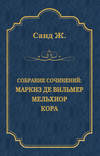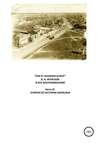Читать книгу: «The Pirate of the Mediterranean», страница 26
“I won’t delay you a moment, Captain Fleetwood,” he said. “But I am determined the pirates shall not find out how we escaped, and, as there is a cliff close here, which overhangs the sea, I will, with your leave, heave the chair, and rope, and block, over it, and they will never discover them there; or if they do, they will think that we got over the cliffs.”
As Fleetwood considered the delay would not be of consequence, and that no harm could arise from allowing the midshipman to have his way, he gave him leave to do as he proposed, and in two minutes he returned, having accomplished his object.
“There, sir,” he said, laughing quietly. “If the pirates miss one of the chairs, they may look for it long enough before they find it or the rope, and in the mean time they will fancy English young ladies can jump forty feet to the ground without hurting themselves. When they try to open the door, too, they’ll think we are inside, for I barricadoed it with everything I could find, and there’ll be a pretty smash when they shove it open.”
“You have done admirably, and now take Marianna’s arm, and follow me,” said Fleetwood, leading the way with Ada.
When Ada Garden found herself once more by Fleetwood’s side, she returned her grateful thanks to Heaven for having thus restored her to liberty; for so strong was her confidence in her lover’s courage and judgment, that she felt as if all difficulty and danger were over, and that success must await them.
Fleetwood also uttered a silent thanksgiving to Heaven, and a prayer for protection during the still greater danger he knew they must encounter in their endeavour to get out of the harbour; but, of course, he did not tell her this. Neither spoke; they both were confident of the sentiments of each other’s heart, and Ada felt it would be useless at that moment to express her gratitude, when she hoped to prove it during the remainder of her life; and he in like manner knew that there would be no necessity to tell her of his love and joy at finding her, when his acts were giving her such convincing evidence of it. They walked on under the shadow of the wall, as noiselessly and rapidly as they could move, towards the commencement of the steep path leading down the ravine. In doing so they had to pass close to Nina’s tower. Fleetwood looked up; no light was seen streaming from the casement, nor was any one heard stirring within.
On they went, and, Fleetwood tenderly supporting Ada, they commenced descending the path. They had got about a quarter of the way down, when Fleetwood fancied he heard the sound of a distant footfall. Could it be the echo of their own feet? he thought, then made a sign to Raby to stop while they listened. There could be no mistake about it. Footsteps were rapidly approaching, and, on looking back, they saw, to their dismay, a dark figure on the cliff above them. Fleetwood drew back under the shadow of an overhanging rock, and he could feel Ada, who had also seen the figure, as she clung closer to his arm, tremble with alarm, which she in vain endeavoured to overcome. Marianna uttered a faint shriek, and was going to repeat it, when Jack Raby gave her a pinch, which effectually recalled her to her senses, and, in a whisper, he threatened to give her another if she made the slightest noise. A minute or two of the most intense anxiety passed away, which, under the circumstances, appeared nearly an hour, and no one appeared.
“If we emerge from where we are, we cannot escape being seen, should the person remain where he was,” replied Fleetwood. “It will be better to confront him boldly, and learn his intention in following us, than to allow him to go back and to give information of our attempt. I will leave you, Ada, in charge of Mr Raby, and will return instantly.”
“Oh, do not quit me!” exclaimed Ada. “I will go with you – indeed, I am not alarmed for myself; but I know not what may happen to you. They may kill you, Fleetwood – oh, do not go.”
“It is absolutely necessary that something should be done, dearest, and there is no greater danger to be feared in going than remaining,” answered Fleetwood. “Ada, I must force myself from you – it must be done.”
“You are right, Charles, I was weak. Go, and I will remain as you wish,” she whispered, relinquishing his arm, and he sprang up the path.
Jack did his best to comfort Ada, by assuring her that his captain could easily manage to thrash a dozen Greeks, and that he was not likely to suffer any harm from a single pirate, at all events. Every moment Ada expected to hear the noise of a struggle, a pistol-shot, or the clash of swords. She listened with breathless eagerness, trembling in every limb, and she would have followed her lover, had she not known that her so doing would be against his wish, and could be of no advantage to him, but might cause great harm. It appeared to her an age since he left her, and her anxiety became almost too great to be borne.
“Oh, Mr Raby, cannot you go up and see what has become of Captain Fleetwood? Some accident has happened to him, I am certain,” she whispered to the midshipman.
“I must obey orders, Miss Garden, and wait for the captain’s return,” was the answer, in the same low tone. “You need not be alarmed, I can assure you – he has not been gone two minutes.”
He had scarcely spoken when Ada’s quick ear caught the sound of footsteps, and she could scarcely restrain her cry of joy, as she sprang forward to meet him. He placed his arm tenderly round her to support her, as he led her on.
“It is very extraordinary,” he said; “I could find no one, though I searched the very spot where I had seen him standing. But, come on, dearest, we have time to reach the boat, and to get outside the harbour before the spy, if such he was, can send people to pursue us.”
“I am able to walk much faster,” said Ada, hastening her steps, “I dread any delay in this dreadful place.”
They had not, however, proceeded many paces, when, on turning one of the many angles of the winding path, a person, the same, they fancied, whom they had before seen, appeared suddenly before them, and laid a hand on Fleetwood’s arm.
“Stay, signor,” he said in a low, deep voice, speaking in the Italian language. “You are already suspected by one who knows not mercy, and if he were to discover your wild attempt to carry off that lady, your death would be the consequence. Return and abandon it; for ere you can get beyond the sound of the waves, as they dash on the cliffs below, you will be pursued and overtaken.”
“I know not who you are, signor,” said Fleetwood; “but, as I believe your warning is given in kindness, I thank you. To follow your advice is impossible, and I must beg you, as a favour, not to detain us – I need not ask you, I trust, not to betray us.”
“I feel sure that Signor Montifalcone will not do so,” exclaimed Ada, recognising at once the voice of the young Italian. “He will rather exert himself to assist us – I am not mistaken in his generosity.”
Paolo was silent a minute, when, releasing his grasp of Fleetwood’s arm, he sighed as if his heart would break, and took Ada’s hand. “Lady,” he said, in a tone of deep melancholy, “you sign my death-warrant; but it shall not prevent me from obeying your wishes. I will accompany you to your boat, if you have one prepared, and, when you have gone, I will endeavour to deceive those who attempt to follow you. Further, I know not how to aid you.”
“We are grateful to you for your promised aid,” said Fleetwood; “and now, lead on, we can ill afford further delay.”
“It is for the lady’s sake I act,” muttered Paolo, beginning to move onward down the path.
Ada overheard him. “It is because you are generous, and would preserve the lives of others, even though you risk your own,” she said, in a low tone, touching his arm. “But if there is danger in remaining here, come with us. You can be conveyed in safety to your native country, and can ascertain if your father yet lives.”
“What! and leave my unhappy sister to her fate?” said the young man, turning round his countenance towards her, which, even with the faint light afforded by the moon, she observed wore an expression of the deepest grief. “I have but one object to live for, – for her sake alone I consent to endure existence. Do not ask me to quit her.”
“Oh that she would have come too,” said Ada. “She might yet be saved.”
“She would not accompany you, lady,” answered Paolo. “Pirate though he is, Zappa is still her husband, and no power would now make her quit him. But I delay you, and increase the risk of discovery, already sufficiently great, by speaking. I will say no more, but that I pray, when in safety in your native land, you will not forget the unhappy exile whom once you knew, and who would gladly have died to serve you.”
He spoke as they walked on, and a few minutes more brought them to the mouth of the ravine, whence a full view of the moonlit bay lay before them.
The Sea Hawk and two misticos were at their anchors. No light appeared on board either of them, nor was there any one moving, that Fleetwood could discover, on their decks; nor was the slightest noise heard, except the low, gentle ripple of the untiring water on the sands; yet so smooth and glass-like was the sea, that every star in the heavens seemed reflected on its surface. He could distinguish, also, the dark boats drawn up on the beach; but he looked in vain for the one his friends were to secure, in which to make their escape.
“They have, with due caution, carefully concealed her,” he said to himself. “When we get more to the left, we shall doubtlessly see her.”
On descending to the sands, they turned, therefore, sharp round to the left under the cliffs, which, it must be remembered, was the direction of the spot agreed on where the boat was to be in readiness. At length they reached the black rock, alongside of which Fleetwood expected to find her, and, to his great satisfaction, he saw that she was there; and his friends directly after rose from her bottom, where they had concealed themselves while waiting for his coming.
“We were alarmed for your safety, Captain Fleetwood,” said Bowse, leaping out to meet them. “We waited so long for you; but everything is in readiness. If you will assist Miss Garden on board, I will take care of Marianna. But who is this stranger with you?”
“One to whom I owe much,” said Ada, stretching out her hand. “Farewell, Signor Montifalcone, may Heaven reward you for what you have done for me.”
“Farewell, lady, and may you never know the grief I am doomed to bear,” returned the Italian; and before Fleetwood, who would have thanked him, could speak, he had retired to a distance; and as they quickly embarked, and urged the boat from the shore, they could see him standing watching them, still as a marble statue.
Chapter Thirty.
“Thank Heaven, you are so far safe, dearest,” said Fleetwood, as he placed Ada in the stern sheets of the boat, by the side of Jack Raby, who, it was arranged, should steer, while he took the stroke oar, his companions pulling the others.
With heartfelt gratitude did Ada thank Heaven, for having thus far conducted them in safety through the perils which surrounded them, and implored protection for herself, and for the gallant men, her deliverers, through those they had still to encounter.
They had well employed the time spent in waiting, by carefully muffling the oars, so that they should make no noise as they worked in the rullocks, and it was now only necessary to take care to let the blades fall into the water, and to draw them out again with as little splash as possible.
Marianna sat opposite to her mistress; and if not the most delighted of the party at the success which had hitherto attended them, she, at all events, gave more vehement expression to her feelings; and Raby had to apply his former remedy to keep her quiet.
At a sign from Fleetwood, the boat was sent gliding off from the rock; but instead of at once steering out into the bay, she was kept close in shore, under the shadow of the cliffs: the blades of the oars just clearing the sand as they went along.
The boat was a very rough specimen of naval architecture, and wore they to have depended on her speed, the chance of escape would have been small indeed. She was built to pull six oars, with a high bow and stern, and though well suited to serve as a fishing-boat, or to live in the short seas of the Archipelago, was not intended to be used when rapid progress was important. The adventurers had, indeed, selected her, not on account of the qualities she possessed adapted for their purpose, but because she happened to be moored close into the shore, near the east side of the bay, and, what was very important, had her oars left on board her. Pietro, who was a good swimmer, had, it appeared, gone off with his knife in his mouth, and cutting her cable, towed her close enough in for the other two to step into her. They had then brought her round, with the same cautious silence, to where Fleetwood had found her.
The hearts of all beat quick with hope, not unmixed, however, with apprehension, as the boat glided along the shore close to the cliffs.
Fleetwood’s glance was roving watchfully round, to notice the first sign of their being discovered, and of any preparations made for their pursuit. The figure of the unhappy Paolo Montifalcone was the only one discernible, as he stood at the end of the rock, to catch a last glimpse of the faint outline of her on whom he had so devotedly set the affection of his ardent nature, without a prospect of return, and his figure soon faded away in the obscurity.
From the shore, the adventurers had now, they thought, less cause to fear; but they looked with suspicious eyes towards the brig, and the two misticos, on the decks of which, at least, one person ought to have been on the watch; but neither of them gave any signs of having life on board.
“If we had suspected the sort of watch there rascals keep, we should have had little difficulty in taking them by surprise,” thought Fleetwood. “We may profit by our knowledge on another occasion, but I am afraid they will not forget the lesson I hope we shall give them, to be more vigilant in future.”
Of course, it is difficult to describe the sensations which alternately filled Ada’s bosom, as the boat progressed round the harbour; hope, joy, gratitude, love, and fear, all were there; and those who would understand what they were, must either have been placed in a similar position, or must endeavour to fancy themselves so placed. At length the eastern point of the harbour was passed, and with the towering cliffs of the entrance rising above them on either side, the clear boundless sea appeared ahead. Jack Raby, with the natural impulse of his age, forgetting his own lessons to Marianna, was very nearly giving way to a shout of joy as he found the boat floating freely on the ocean he had learned to love and to confide in; but he recollected himself in time, and merely uttered a whispered “hurra,” which could not have been heard above the splash of the water on the rocks close above them.
“Port your helm, Raby, and let us shut out the bay as fast as we can,” whispered his captain. “We shall still keep under the shadow of the cliffs for a short distance, to avoid the risk of being seen from the eastern towers. That will do, steady.
“Keep up your courage, my sweet Ada, for a few minutes more,” he said, turning his eyes to her countenance, from which, indeed, his glance had never been absent longer than was necessary to watch for their safety. “We may now congratulate ourselves on having every chance of escape. In less than half an hour we shall fall in with the Ione’s boats, and then we may defy the whole nest of pirates to stop us.”
“I shall have no further fear when we have lost sight of that dreadful vessel, which looks even now like some slumbering monster about to awake and rush after us,” she answered, pointing to the Sea Hawk, which lay still open inside the harbour’s mouth.
She had scarcely uttered these words when a loud shout was heard, which seemed to proceed from some one on board her, and a musket was discharged at them. The shouting was repeated, and words were clearly distinguished.
“We are discovered,” exclaimed the Greek captain. “Pull, pull, as hard as we can, the watch on deck is calling on us to come into the harbour. He has evidently just woke up, and is yet uncertain what we are, though he suspects us. He threatens to fire the guns at us if we do not obey him, and that will have the effect, though we escape the shot, of waking up the rascals in all quarters, and we shall have a whole fleet of boats after us: stay, I will hail in return, and pretend we are fishermen.”
On this he stood boldly up in the boat, and cried out in Romaic, at the top of his voice —
“What fool is that on board the Sea Hawk, who has been sleeping on his watch these four hours past, and now makes so much noise, because others more industrious get up early in the morning to follow their avocations? We should have little fish to eat if we were to trust to you for the supply.”
“Who is it?” exclaimed the same voice. “Is it you, Balbo?”
“Yes, yes,” answered Captain Vassilato; “I should have thought you would have known my voice.”
“Who is it?” hailed another person, apparently on shore.
“Gerasimo Listi,” answered the watch on the Sea Hawk’s deck.
“No, no, the old fellow lies drunk at home!” exclaimed the second speaker. “Treachery, treachery. They are the spies endeavouring to escape.”
“It is hopeless to deceive them,” said Captain Vassilato, when he heard these words, which he translated to his companions as he resumed his seat and oar. “We must pull for our lives; we have a good start, and it may be some time before any boats’ crews can be collected to pursue us.”
It is needless to say with what energy all hands bent to their oars – concealment was of no further use, and they were able to put their whole strength into their strokes. There was no time to be lost. The brig was swinging with her broadside across the mouth of the harbour, and as soon as those on her deck could procure matches, they rushed to the guns, and discharged them in quick succession; and Ada could scarcely restrain a shriek of terror as she saw their bright flashes lighting up the mouth of the harbour – the sides and rigging of the vessel now crowded with people – and heard their loud report echoing among the cliffs, as also the rushing noise of the shot as they came flying by – some over their heads, some close astern, and others ahead of them; for though the pirates’ aim was very uncertain, yet, as from the narrow entrance of the bay, the only shot which could reach them must come between the cliffs, they could not go far distant from them. One or two, apparently, from the peculiar noise they made, hit the cliffs, and rebounded back into the bay. Marianna, whose fears had completely overcome her, crouched down at the bottom of the boat, where she thought she should be more secure; and Fleetwood entreated Ada in that respect to follow her example, desiring Jack Raby to place her as low down as possible, where a shot was less likely to strike the boat. Though she was unwilling to be more sheltered from danger than he was, yet she saw that her so doing would relieve him from some of his fear for her safety, and she complied with his wishes; reclining on some jackets and cloaks which Jack Raby spread out for her, she saw no more of what took place, though the noise of the firing soon ceasing told her that they had shut in the brig by the western cliffs.
“Remain where you are, dearest,” said Fleetwood, as she was about to rise. “We may still have some shot sent after us, when the boats, which will probably pursue us, get outside; and though, with the start we have, they are not likely to take good aim, a fatal one may come on board; and think, Ada, of how little use would be the risk we have run, if you were to be the victim. But do not be alarmed; no enemy has yet approached.”
I do not know if I have explained clearly the position of the boat: she was at this time about an eighth of a mile from the lofty cliffs which formed the western side of the bay, with her head to the west, going at the rate of between four and five knots an hour, which was the utmost speed with which, with all their exertions, they could urge her through the water. The cleft in the rock, as now the entrance of the harbour appeared to be, was seen over their starboard quarter, and in that direction their eyes were anxiously turned for the appearance of the boats they fully expected would follow them. A new danger also appeared from a quarter they had not expected, for along the summit of the cliffs, as seen against the bright blue sky, they could discern some figures running at full speed, and they were not left long in doubt as to their intentions. The persons halted, and the bright barrels of their guns gleamed in the moonlight, as they brought them to their shoulders and fired. Several balls flew by them, and one struck the gunnel of the boat, though, fortunately, no other damage was done. The pirates kept shouting out their threats of vengeance, and firing away, apparently to intimidate the fugitives, little understanding the character of the people with whom they had to deal.
Here, of course, Ada was exposed to as much danger as the rest; and though Fleetwood would have joyfully interposed his own person to preserve her, it was impossible for him to do so, and all he could do was to entreat her to remain down as much as possible under the seat, and to redouble his efforts at the oar.
“We shall soon be beyond the range of those fellows’ guns!” he exclaimed. “But ah, there’s a boat’s bow creeping out from between the rocks. We’ve a good start of her, however. Give way, gentlemen. We’ll lead her a long chase, and find her a warm reception at the end of it, I hope.”
“She’s not alone, though!” exclaimed Bowse, whose eyesight was remarkably keen. “There’s another close astern of her, and, by heaven, there’s another just rounding the point. We shall have enough of them to look after us, at all events.”
“It matters little how many, provided we keep ahead of the leading one,” said Captain Fleetwood, in a cheerful tone, not as much for the object of encouraging his rude companions, as for the sake of keeping up Ada’s spirits. “I don’t think any of them are likely to pull much faster than we do.”
These remarks were made slowly and at intervals, and perhaps even fewer words were really used, as any one who has pulled a heavy oar, for life and death, will know the utter impossibility of carrying on an unbroken conversation, as I have written it down.
They had by this time nearly doubled the distance they were from the shore when the first boat was seen, and had thus gained the best part of half a mile from the harbour’s mouth. The nearest of the pirate’s boats was rather more than a quarter of a mile off, which in a stern chase, with slow-pulling boats, was a considerable distance.
The other boats they would not have seen at that distance, had not, as they pulled out, a gleam of moonshine fallen on their bows, and tinged their foaming wake with a line of gold, as they rounded the point before they could stand to the westward in pursuit. The night remained as calm and beautiful as at first, and the moon, though still young, afforded sufficient light to enable the pursuers and pursued to distinguish each other, as they urged their boats through the water.
Fleetwood’s arrangements had been as follows: Provided the weather was sufficiently moderate, in Mr Saltwell’s opinion, with whom all authority rested, to permit him to venture to sea, with safety, in an open boat, he was to get under-weigh, in the Ione every evening; to stand in till within sight of the island, and to send the boats on with all hands, well armed, to within about two miles of the island, due west of the harbour, or much nearer if the night should prove dark; but they were especially to avoid any risk of being seen from the island. As morning dawned they were to retire gradually, keeping a bright look-out for him, and they were then to return on board, and the Ione was to stand back to her anchorage.
As the night was decidedly bright, Fleetwood did not expect to find the boats nearer than within the distance he had fixed on, and they had then a mile and a half at least to sail before they could come up with them; but he hoped that the firing would have attracted their attention, and that, suspecting its true cause, they would have pulled closer in. Raby stood up as he steered, to peer into the darkness, but no sign could be seen of the wished-for boats.
“May I hail, sir?” he asked. “The pirates will only think that we are laughing at them, and perhaps some of those with Mr Linton may know my voice.”
“Yes, hail if you like; but we are still too far off for them to hear you,” said Fleetwood.
On this, Jack Raby, putting his hand to his mouth, gave a long shrill cry, which might have been heard a mile off; and it must have made the pirates think that one of them was wounded; but no answering hail was given.
The pirates’ boats, though so suddenly manned, were pulled well, and were decidedly overhauling the fugitives. Fleetwood remarked it, but he said nothing. He still hoped that as the distance was short between them, and when they might not only obtain assistance, but retaliate on the enemy, they might gain it before they were overtaken.
“It’s surprising that the pirates in the boats don’t fire on us,” observed Bowse. “They must see us clearly enough to take good aim at this distance. I suspect they have no fire-arms with them.”
“Depend on it, they are not without them,” replied Captain Vassilato. “His rifle was the first thing every man snatched up, as he left his hut and sprang on deck to jump into his boat. No, no, they make sure of coming up to us, and anticipate too much satisfaction in cutting our throats, to throw away a shot on us.”
“They would be less chary of their powder if they knew how short a distance our friends are from us,” said Fleetwood.
It occurred to him, also, that probably Zappa himself was on board one of the boats, and that he would not fire for fear of injuring Ada; for, judging from his own feelings, he had from the first, thought, and justly too, that the pirate was influenced to carry her off, more by his admiration of her than for the sake of her ransom, and this caused him still more anguish, when he saw the probability of her again falling into his power.
“I think there is a slight air springing up from the eastward, sir,” said Jack Raby, as he sat down again to steer. “I wish we had a sail to drive her on faster.”
“I fear, indeed, that there is a breeze getting up,” said Fleetwood, in a tone which ill concealed the apprehensions he felt. “The other boats, however, may not have sails. They must all have come off in a great hurry.”
“I see something which has a sail, though,” exclaimed Bowse. “The rascals have towed out one of their cursed misticos, and we shall have her after us presently. I see her white canvas, even now, gleaming in the moon-light. She does not feel the breeze yet, for there is a little northerly in it, and the cliffs becalm her.”
“I fear you are right, Bowse,” said Fleetwood. “I have just now, also, caught a glimpse of her; but the breeze is still very light, and will not send her faster through the water than the boats can pull, so we need not fear her, I hope. It convinces me, also, that the boats have no sails; but that they believe we have, and might, if the wind increases, get away from them. Courage, my friends, we must not despair.”
“We may give them a tough job to take us, sir, even if they come up with us,” exclaimed the young midshipman, glancing over the boats, which were clearly overhauling them. “There are five of us,” – he reckoned himself a man in strength, as he was in courage – “and, with arms in our hands, we may thrash a few dozen rascally pirates, any day. But it may be as well to sing out again, and let our friends know our whereabouts.”
He jumped up as he said this, and shouted at the top of his voice; but no hail was heard in return; and it now became too probable that, owing to the calm which had prevailed all day, the Ione had been delayed, and that her boats had not reached their station; for, otherwise, as Fleetwood suggested, they would most certainly have pulled towards them directly they heard the guns of the Sea Hawk. Again and again Jack Raby hailed, with the same result; and it now became very certain that they must not depend on the speedy assistance of their friends. To say that Fleetwood’s heart sank within him, as this circumstance became evident, would be wrong; at the same time that he saw clearly the very great danger to which he and those with him were exposed.
“That they have refrained from firing shows that they will not injure Ada; and when she tells the pirate that a large ransom is ready to be paid for her, he will send her, unharmed, on board the Ione; and, for ourselves, we must sell our lives dearly, as brave men should do.”
He thought this, as he saw the leading Greek boat rapidly gaining on them, and now little more than two-thirds the distance she had been before; while they had pulled rather more than a mile from the shore, which now rose dim and frowning astern of them. At the same rate they might thus pull two additional miles before they were overtaken; but then it was utterly impossible that their strength would enable them to continue urging the boat through the water at the same speed they had hitherto been doing. Could they indeed do so, it would be, they soon saw, to little purpose, for every instant the breeze increased, and the mistico was already up to the sternmost boats. They now saw that she had her sweeps out, as well as her canvas set – which, of course, still further lessened their chances of escape.
Покупайте книги и получайте бонусы в Литрес, Читай-городе и Буквоеде.
Участвовать в бонусной программе













